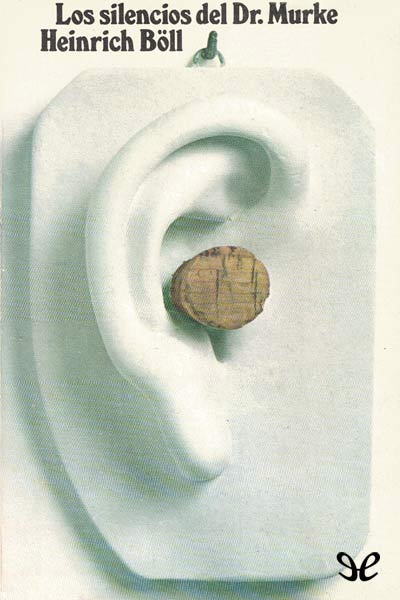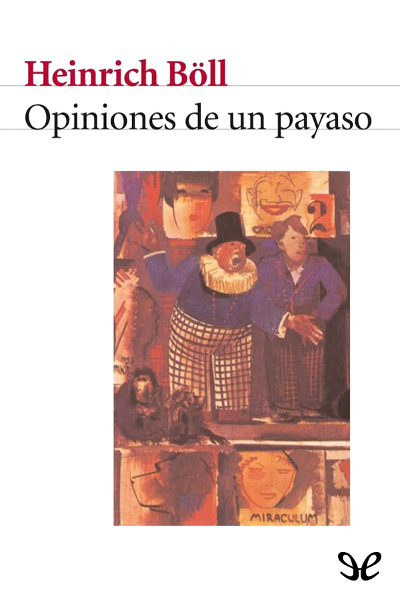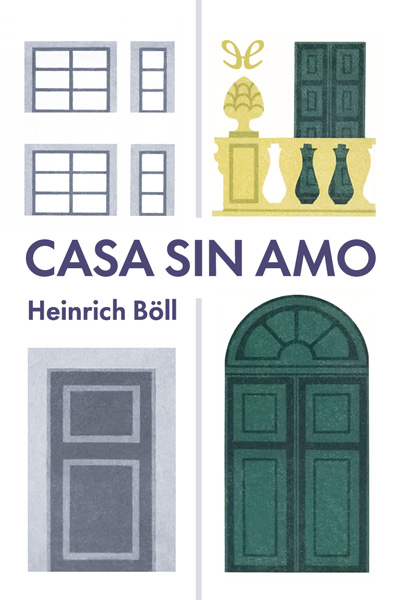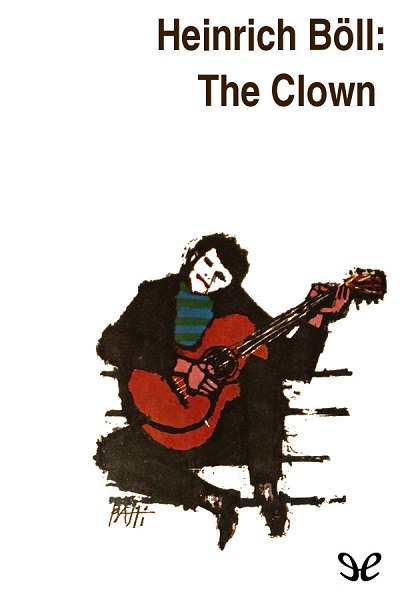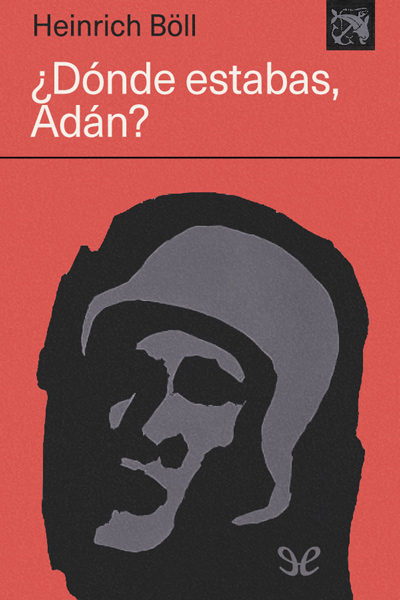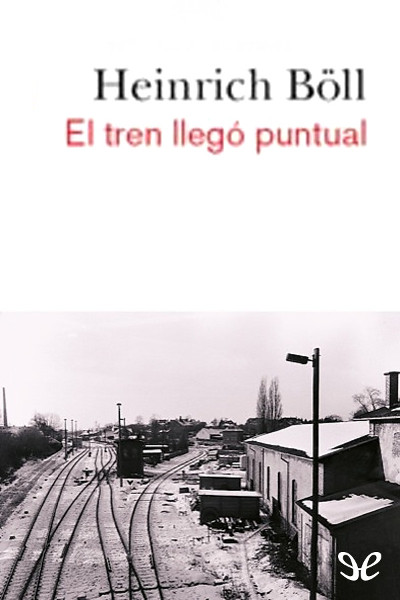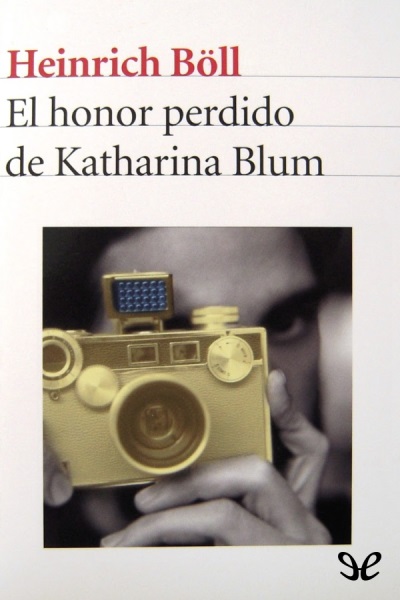oleebook.com
Biliardo alle nove e mezzo de Heinrich Böll
de Heinrich Böll - Género: Italian
Sinopsis
Nella sala da biliardo dell'Hotel Prinz Heinrich, Robert Fähmel, ultimo erede di una famiglia di architetti, racconta le brutalità del periodo nazista cercando di ricostruire le ragioni che lo hanno spinto a demolire l'Abbazia di sant'Antonio, costruita dal padre. Uno spaccato della tragica vicenda della Germania dal 1907 alla fine degli anni Cinquanta.
Libros Recomendados - Relacionados
Reseñas Varias sobre este libro
Every day at half-past nine Dr. Robert Faehmel plays billiard in the Prince Heinrich Hotel and tells an adolescent bellhop the story of his life
Then take my word for it, just let young Faehmel play his billiards in peace. A fine family. Really is. Class. I knew his grandmother, his grandfather, his mother and his uncle. They used to play billiards here themselves, fifty years ago. You wouldnt know, of course, but the Kilbs have lived on Modest Street for three hundred years. That is, they always did there arent any left any more. His mother went off the beam, lost two brothers and three of her children died. Never got over it. Fine woman. The quiet kind, if you know what I mean.
And his father, the old architect, recounts to his sons secretary about his young years and his first professional success
Every day I walked four kilometers, in one hour, always the same way at the same time. I meant to be seen, and seen at the same place at the same time, always. Shopgirls, bankers and jewelers, whores and cab drivers, store clerks, waiters and housewives, I intended that they should see me, and they did, from five to six, cigar in my mouth. Impudent, I know, but Im an artist, pledged to nonconformity. A man me is permitted to stand and listen to the organ-grinder, and make capital of the melancholy of the hours when work lets out. Permitted to frequent dream streets in the city of dreams.
Two wars are behind Some are born to build and some are born to destroy And today is the old mans eightieth birthday All of his few relatives must be present at his birthday party All those who managed to survive
Your Excellency, weve reserved Room 212 for you and your wife, pardon, for your wife and you. Any luggage at the station? No? Anything to be brought from your house? Nothing. Oh, only for two hours while the fireworks are on, and to watch the Veterans parade. Of course there are seats for six people in the room, theres a large balcony, and if you wish we can have the beds pushed together. Not necessary? Hugo, Hugo, show the ladies and gentlemen to Room 212, and take a wine list with you. Ill send the young people up to your room.
The huge and heavy wheels of history and ideology roll uncaringly over everybody and those who arent outright crushed are left behind crippled and traumatized.136 s Ahmad Sharabiani9,564 51
(Book 466 from 1001 books) - Billard um halb zehn = Billiards At Half-Past Nine, Heinrich Böll
Billiards at Half-Past Nine is a 1959 novel by the German author Heinrich Böll. It reflects the opposition Böll, who won the Nobel Prize for Literature in 1972, had to the period of Nazism as well as his aversion to war in general. The entirety of the narrative takes place on the day of September 6, 1958 but the story stretches back through the use of flashbacks and the retelling of memories of the characters. It focuses on the Faehmel family's history starting from the end of 19th century until the present day of 1958.
??????? ?? ???? ?? ? ??? - ??????? ?? (????) ?????? ?????? ????? ?????? ?????: ??? ???? ? ???? ??? ?????? ???2011??????
?????: ??????? ?? ???? ?? ? ???? ???????: ??????? ??? ?????: ??????? ????????? ????????? ??? ?????? (???????????? ???? ? ???????)? ???1377? ??292?? ????9644353048? ?????: ????????? ????????? ????? - ???20?
?????: ??????? ?? ???? ?? ? ???? ???????: ??????? ??? ?????: ??????? ????????? ????????? ???????? ????? ???1389? ??325?? ????9789642090549? ??? ??? ???1391? ??? ??? ???1392? ??? ????? ???1395? ??? ???? ???1397?
?????: ??????? ?? ???? ?? ? ???? ???????: ??????? ??? ?????: ????? ?????? ????????? ??? ??? ??????? ???1395? ??310?? ????9786005981803?
?????: ??????? ?? ???? ?? ? ???? ???????: ??????? ??? ?????: ????? ??????? ????????? ??? ????? ???1397? ??328?? ????9786003763012? ??? ??? ???1398?
?? ??? ???? ????? ???? ??????? ?? ??? ?????? ? ??????? ????????? ???? ?????? ???? ??? ?? ??? ???????? ????????? ?? ??? ?? ???????? ? «????» ???? ???????? ?? ?? ????? ??????? ?? ???? ??????? ? ??? ????? ?? ????? ?? ????? ??????? ? ???? ?? ?? ?? ??? ??????? ?????? ? ???? ???????? ?? ???? ?? ?????? ??????? ? ???? ? ??? ?? ????? ???? ??????? ? ????? ?? ????? ??? ?? ???? ?? ????? ???? ? ?? ????? ?? ?? ???...? ????? ?? ??? ? ???? ?? ????? ?????? ???? ?????? ?????? ?? ???? ?? ???? ?? ? ??? ?? ???? ?????? ?? ??? ??????? ???? ??????? ?? ??? ??? ?? ???? ????? ??? ?? ????? ???? ???? ??????? ? ??? ? ?????? ? ?? ???? ????? ? ??????? ???????? ?????? ????
????? ?????? ????? 11/05/1399???? ???????? 30/02/1401???? ???????? ?. ??????? Steven Godin2,553 2,696
Set in post-war Germany in the late 50's (although large parts of the narrative focuses on events from the past), Heinrich Böll has written a multi-layered and complex work of brilliance, that uses a free-form narrative, and, on a limited scale, a more structured recognizable one, which alternates around depending on whether in the past or present. And I have to say it's masterfully done. Böll starts out by giving nothing away, regarding names, where we are, or what's going on, landing the reader smack-bang in a scene that could have been plucked from the middle of a story rather than the beginning of one. Adept, and with a keen eye, he unravels the Faehmel family that lie at the heart of his novel. Covering three generations of the family, two world wars, thus spanning many decades. You might think a sweeping epic is on the cards, but it fact, it's quite the opposite. In real time, the novel plays out over only a single day.
One could believe the grass roots of the novel lies with father and son architects. Heinrich the elder, is selected post-WW1 to rebuild a local abbey suffering from neglect. The son, Robert (who plays billiards, with a cognac, without fail, from half-past nine to eleven), follows his father's footsteps into the building trade, but then averts away from development into demolition during WW2. And then we have Joseph, Robert's son, who wise keeps with family tradition. But, actually the core theme of Böll's novel is that of the struggles of women, especially that of the mother, entrenched in the ideas of virtue, sacrifice, and honesty, and how greater the choices made can affect the wider scope. So, in essence, the manic confessions of Robert's mother, Joanna, really is the bread and butter of Böll's story. It is also, more importantly, a searing indictment of Nazi Germany.
The more I think about the level of depth Heinrich Böll depicts throughout the novel, the more passionate I will praise it. And I could write on and on about the many different underlying questions Böll has us locked into, but wouldn't want to serve everything up on a silver platter.
I simply found this immensely rewarding, more so, because it does require complete and utter attention. No, it's not one for the beach. It's a book I could have locked myself away with in a panic room. The key information to the novels interior is presented seemingly at random, and then given weight and context as the story slowly unfolds. For me, it was wearing in a new pair of shoes that looked uncomfortable, expecting blisters, but then not getting any. How he approached the novel was intelligent, thought-provoking, tough when it needed to be, but also humane.
And it was great not to be spoon fed all the details, it made for a better read, and Böll absolutely knew this. It's in no way a book for the masses, but I couldn't care less. It's all the better for it.classic-literature fiction germany ...more107 s Lisa1,056 3,314
The functioning of my memory could possibly be compared to my attempts at playing billiards.
Not really knowing the rules, not knowing the techniques, not understanding the meaning of the coloured balls spread out over the green cloth table, I take a queue and make a random decision to hit one ball. In the best of cases I succeed, but then a chain reaction of uncontrolled further action takes place, and under no circumstances do I ever manage to conclude what will be the effect of my initial trial.
The billiards game of my memory led me here today.
I was engaged in a discussion on human constructive and destructive behaviour, and the white ball on a billiards table, the discussion kicked off a memory chain reaction leading me back to this novel, a once-in-a-lifetime reading experience not only for its important content in itself, but also because of the initiation rite into Böll's world that it constituted, after some school attempts at his shorter fiction.
It is Buddenbrooks all over again, and yet so much darker, and at the same time lighter. Families build close relationships only to know how to hurt each other best. They have ambitions in the name of the shared name, only to betray the most cherished ideals of the clan as soon as they get a chance. They are exclusive clubs, and yet each member brings the flavour of the outside world into the explosive Molotov cocktail.
Heinrich Böll loves to describe the Trümmerlandschaft that became his theme and his literary writing style as well. And nothing symbolises the architecture of German history better than the fate of the builders and buildings in a family that lives through the darkest times in German memory. And a construction rising on the ruins of a destroyed culture, "Billiard um halb zehn" stands for the regenerative forces at work even in the most hopelessly lost civilisations.
If you manage to dig through the rubble and shards of this collapsed story, you will see that the puzzle makes sense, and that the billiards table is a cosmos full of life to be studied and cherished. There are rules, but it is hard to follow them even if you try!1001-books-to-read-before-you-die favorites heinrich-boll ...more78 s Ilse491 3,773
Memento quia pulvis es et in pulverem reverteris, as we are quite clearly told. Dust the mortar leaves behind, deeds of mortgage, houses and estates, a statue in a peaceful suburb where children as they play might ask, ' And who ' s that man?'2021 germany68 s Melindam719 344
Heinrich Böll is my HERO! His books have their own bookshelf in my home and hold a special place in my heart.
Billiards at Half-Past Nine was the first book I read by him during my university years and its effect was instant and enormous. Afterwards I read his books in a row one after the other.
Böll's strong sense of justice, his representation of Truth is shining through his works the desert SUN. It is blinding, burning and merciless, there are no shadows to hide in. The TRUTH is there, very much in your face: you cannot conveniently close your eyes and ignore it.
I guess Böll's literary work -facing the truth, no matter how hard it gets- was essential and instrumental for a German society recovering after the devastating WW II. He was a widely read and acknowledged author, but also widely spurned for the same reasons, at the same time.
His literary technique is very "typical", easily recognizable. Reading his books is putting together a puzzle. Pieces get offered from different people's perspectives, the story is getting deeper and more complex as flashbacks and memories of several characters are written in the first person, yet they all get filtered by an omniscient narrator.
Gradually, we get full access to characters and their stories by their own memories as well as through the perspectives of others, we can see them from all sides and it is intriguing as well as emotionally involving.
A highly recommended read.classics german48 s Steve441 530 Read
Heinrich Böll with his eternal cigarette(*)
Sometimes the Swedish Academy does get things right, and one of these times was the award of the Nobel Prize in 1972 to Heinrich Böll (1917-1985), the year after he published the excellent Gruppenbild mit Dame (though probably my favorite is Ansichten eines Clowns, whence the above quote is taken). I have just re-read one of his better early novels, Billard um halbzehn (1959),(**) and am once again seduced by the many fine qualities of his prose.
Though those of my generation may roll their eyes at this truism, it could well be the case that members of more recent generations are unaware that, for completely understandable reasons, in the first decade after World War II the German people had no desire to dwell on what had occurred from 1933 to 1945. After all, they were hungry, their cities were in ruins, their country was divided in two and occupied by four foreign powers, just to mention a few things. In East Germany the Communist Party was able to blame the "other Germans" - a stance which the East German people were gratefully able to adopt - while in West Germany conservative capitalists had taken over the reins again after only a brief interruption and did not want anyone looking too closely at what they did during the war. This began to change a bit during the late 50's and early 60's after the "Economic Miracle" of the 50's had greatly improved the standard of living in the Federal Republic.
Böll was one of the first significant German authors to deal with WW2; already in 1949 he published Der Zug war pünktlich, set in 1943, in which he, among other things, displayed the inhumanity of the values of that time. But already in that early text he was no one-note-Charlie. Indeed, in another famous quote Böll said that the most important topics for him were religion and love.
So, though WW2 plays an important role in Billard um halbzehn, quite a bit more is going on in this tale of three generations of architects, the Fähmel family, leading up to the fateful 80th birthday of the eldest, Heinrich. Böll artfully eases into his story by introducing the Fähmel's through the eyes of the secretary of Fähmel #2, Robert, with humor and foreboding. Böll's third person narrator moves among the characters and follows their thoughts and, above all, their memories, jumping through time from as early as 1894 till the novel's present, 1958. The reader must piece together the story from this kaleidoscope, but Böll does not make this difficult. In fact, there is a hint of the pleasure of reading a well written detective story as the pieces slowly fall together. At the same time an ominous tension is established and increased until the final explosion.
Within this rich story of the intertwined lives of multiple generations, of joy and loss, of ambition and futility, betrayal and forgiveness, subservience and resistance, is mixed the many different ways people could and did choose to act during the period 1933-1945 and the price each had to pay for their choices. At the same time, Böll also addresses the ways in which Germans dealt with the consequences of these choices in the emerging postwar society. All the while, even when evoking the former Nazi who became an important figure in the postwar reconstruction or when Robert is being whipped with barbed wire, Böll's limpid prose flows smoothly and calmly, never psychologizing and occasionally revealing a wry humor that had me laughing aloud. The old hotel porter, Jochen, is priceless.
This is one of Böll's generous handful of outstanding books.
(*) The well-known quote by Böll means: Atheists bore me, they are always talking about God. Not actually relevant here, but I the photo.
(**) Available in English translation under the title Billiards at Half-Past Nine.
Cologne - Heinrich Böll's hometown and the primary setting for Billard um halbzehn
Rating
http://leopard.books.com/post/112...german world-war-245 s George Georgiadis46 70
?????????? ??????, ????? ????? ??? ?? ?????????? ?????? ?? ??????? ???? ???? ?????????????? ?????????? ??????? ?? ????????: ??? ?????????? ???? ????? ??? ????????????? ??? ?????????????? ??? ???????????? ?????????, ??????????, ??????, ????, ??????, ??? ???? ??? ??? ??????????? ?????????? ??????? ??? -??????- ?? ???????? ??? ???????? ?????? ???? ??? ???????????? ????????. ?????????? ??? ?????? ???????.wurst34 s Sofia293 111
??? ??????? ???? ?? ??????, ??? ????? ???? ??? ????? ??? : "??? ???????? ?????? ??? ????? ??????????? ????? ??? ???? ??? ?????????? ?? ???????????"
??????? ?????? ???? ??? ??????????? ?????? ??? ??? ???????????? ???????? ??? ?????????? ????? ?? ????? ????? ???????? ?????? ????? ?????? ?????? ?? ??????. ?? ????? ??? ???? ??? ??? ???? ????????????? ?? ?????? ??????.
??? ?? ????????? ??? ?? ???????? ????? ??????? ????. ?? ????????? ????? ???????? ?? ??????? ??? ????? ??? ???????? ??? ?????? ?? ????? ? ?????????? ????? ??? ??????. ?? ?? ??? ??????? ????? ?? ???????? ??? ???????? ?? ???????.29 s °°°·.°·..·°¯°·._.· ????? ??????? ???????? ·._.·°¯°·.·° .·°°° ?·.·´¯`·.·? ?????? ???????? ??????? ????????? ??736 841
????????? ???? ?????????, ?? ??? ???????? ??? ?????????? ???? ???????? ???? ?????,
??? ???????????? ????????? ??? ???????
??? ??????, ??? ??? ???????? ?????????.
?? ???? ???? ????, ????, ??? ?????? ??????,
????? ???? ??????? ??? ????? ??? ?? ???????
???? ??????? ????????? ??? ???????????
?????????? ?????? ??? ????????? ???? ??? ?????.
? ?????????????, ????, ???? ???? ???? ????.
???????? ???? ????? ??? «??????» ??? ?????? ????.
??? ????? ????????? ?????? ??? ??? ?????????? ?? ??????? ????.
??? ???? ??????? ??? ??????? ?? ?????????
??? ????????? ?? ??????? ??? ?????? ??????.
??? ??????? ??? ????????? ??? ????????? ??????????, ??? ??? ?? ??????, ??? ??? ?? ?????? ???? ?????
??? ?????????? ????? ????? ??? ???? ???? ???
??? ?????????? ?? ????? ?????? ??? ??????????? ??? ???????? ?????.
???, ?? ???????? ?????????? ??????? ???? ??????? ??? ??????? ????? ????? ??? ?? ???????? ??? ????? ??? ?????????? ??????? ???????, ??? ? ????????? ??? ???????? ?? ????????? ??? ??????? ??? ??????,
?? ??? ??? ??? ??????? ??????? ???? ??????? ? ???????. ?? ???? ????? ??? ?? ???????? ??? ??????? ?? ?????????? ?? ?????????? ???????? ??? ???????? ??? ??????.
???? ????? ??? ? ??????? ??? ???????? ?? ?????
??? ??? ?????? ??? ??????, ??????, ?????????? ?? ????????? ??? ????? ??? ????????? ??? ?? ?? ???????, ??? ?? ?? ?????????? ??? ??? ?????? ??? ???????,
????? ?? ????? ?? ???????? ???? ?????????, ????????????? ??? ?????.
???????????? ?? ????????. ??????????? ?? ?????????.
??? ??????? ??? ??????, ??? ??????????? ??????? ? ???????? ??? «???????????? ?????????» ??? ??? ????? ?? ???? ???????????? ???????? ???? ??????? ????, ???? ?? ????? ????? ??? ?????????? ??????.
? ?????????? ???? ??? ??????? ????? ??????????? ?? ??? ????????? ??? ??????? ????? ???????????? ??? ? ???????????? ?????????? ??? ???????? ?? ? ?????
??? ????, ????????? ?? ??? ??????? ????????????? ????????? ????????????? ???????????.
?? «????????? ???? ?????????» ??? ????? ??????? ?????? ?????????. ? ???????????? ??? ????????? ????????
??? ???????? ??? ?????????, ?????? ?? ?????? ?????? ?? ???? ????????? ??? ?????????? ??????????? ? ?? ??????????? ?????? ??????? ?? ?? ???????? ?????????? ???? ???? ??? ??????????????.
????, ???? ?????????, ??????? ??????????
??? ????????, ??? ?? ???????? ???????????????? ????? ??? ??????? ???????,???
«????? ??? ??? ??????» ??? ???????? ????
??? ???? ?? ?????? ?????????? ???? ?????????
?? ??? ?????? ???? ???? ???? ???????? ???
«???????? ??? ????????»,?????????? ??? ???????, ??????? ?????, ??????? ?????? ??? ????????????? ??? ??????????????? ???? ??????????.
????, ?????????????? ????? ?? ????????? ??? ?????????? ??????. ???????, ???????? ??? ?????????, ???????? ?????????????, ???????????? ????????? ???? ??????? ??? ????????, ?????, ???????,
?????? ??? ???????????? ????, ??????????? ??????????? ???????????, ???????????? ?? ????????? ???????????? ?????? ??? ??????, ???????, ??????????, ???????? ????? ?????, ??????? ???????????? ??????????? ??? ??????????? ??????????? ??????? ???????.
??? ?????? ????? ?? ???????????????? ?????
??? ????????????????? ???????? ?????????
? ????? ??? ??????????? ??? ????????, ??? ??????,
??? ?????? ??? ??? ????????? ??? ?????????? ??????????????? ????????? ?? ??? ??????????
??? ?????????????, ????????? ??? ???????, ?????? ????????, ??? ?????????? ?? ??? ???? ????.
??? 6? ??????????? ??? 1958, ??? ??????? ????????????- ????????? ??? ?????????? ?????
??? ??????????? ??? ????? ??? ???? ????????? ?? ??????????? ?????????.
? ????????????? ??? ????????? ( ?????) ??? ??????
?? ??? ?????????????? ????? ???????????? ?????????? ??? ?? ???????????? ???????? ??????? ?? ?? ?? ?? ????? ???? ??????? ? ???? ??? ???? ??? ? ???? ??? ???????. ?????? ?? ?????? ???????? ??? ? ???????????? ????????? ?????????? ??? ???? ??? ?????????? ???????? ??? ??? ????? ?????? ?????????? ?????? ?????? ??? ??????????????.
?????? ???? ???? ?????????? ??????????? ??? ?????? ??????????? ????? ??? ???????????? ?????????? ???? ?? ??????????? ? ??????? ??? ????????? ??? ??? ???? ??? ????? ????? ??? ?? ???????????? ??????? ??? ?????? ?????? ??? ??? ?????????????? ??????????
??? ?? ???????? ??????????????? ?? ???? ?????????? ????? ??? ??? ??????????? ???? ????????? ?????? ???????? ???? ?????? ??? ??????????, ?? ?????? ???
????? ??????? ???????????? ?????? ???? ???? ???
?? ???? ????????????? ???????????? ? ?????????????? ??????????.
????? ????, ??????? ??? ??? ???? ???? ????????????????? ?????????? ?????.
? ?????????? ??? «?????????? ??? ??? ???????????» ??? ??????? ??? ??????????? «?????????? ????????????» ????????.
?? ??????? ???????? ??? ?????? ??? ?? ????????????
?? ???????? ??? ?????????? ?????? ????? ? ????? ?????????????? ??????????? ??? ???????????,
? ????? ???? ???????????? ??????? ??? ??????????? ??? ???????? ???? ?????? ??????? ?? ????? ??? ???????? ? ????????? ?????????? ??? ??????? ?? ????????? ????? - ?-??????? ??? ????????????? ?????, ?? ????????? ??? ??????? ?? ??? ????????? ????.
?? ????????? ???? ????????? ?????
??? ???? ??? ????? ????????? ??? ?? ???????? ????? ???????, ??????????, ??????????, ?????, ????
??? ???? ??? ????.
????? ??????????? ?????????? ???
????????- ?????????????? ??????, ??? ?????? ??????? ???? ???? ???????? ????????? ??? ??????????? ?? ???? ?? ????????? ?????.
?? ????? ?????????????? ??? ???????? ???? ????????? ????????? ????????? ????? ?????? ??? ??????????? ??????, ?? ??????? ???????? 80 - 100 ??????.
? ?????????? ???????????? ????????? ??? ???????????? ??? ???????????? ????? ????????? ?? ???? ???????? ???????? ??????? ??? ?????????:
?????????? ??? ??????????????, ???, ?????????? ??? ????????, (????????? ??? ???????????? ??? ????????? ??? ?? 1919 ??? ??? ????? ???? ??????? ??? ?????????? ????????? ??? ?????? ?? 1933) ?????????????????, ???, ?????????? ??? ?????????, ???????????? ????????.
?? ????????? ??????? ???????????? ????? ???????????? ????????? ????????????? ????????
???? ???????? ????? ??? ?? ?? ?????? ?????? ?? ???????? ??????? ??????????? ???????? ??????????? ?? ???? ????????? ??? ????????? ? ???????? ???????? ??????????? ??? ?????? ??? ?????????? ?? ????? ?????? ?????? ???????? ??????????????,
?? ?? ??????????? ??? ???? ?? ??????? ????????? ?????? ???? ??????? ??????, ???? ????????? ?????? ??? ???? ????????????? ????????????? ??? ???????? ?????? ??????? ??? ????? ??????? ??? ????????.
???? ????????.
??????? ?????????
humming-closer-no-hesitation-give-m30 s Konstantinos104 19
?????????? ??? ?????? ??????? ?? ??????? ??????????, ??? ???? ????????, ?? ????? ????? ???????? ??? ?? ???? ???????? ??????? ???? ???? ??? ??? ???????????? ?????????. ?? ?? ???????? ??????????? ???? ?? ??????? ???? ??? ???????? ????. ????????? ? ??????? ??? ??????? ??????.26 s Katia N611 823
It is amazing how a prose can be so effortlessly beautiful and meaningful at the same time! It is also such a rarity
The novel takes place during one day in 1958 in Cologne. It is focused on the 3 generation of the family of architects getting to grips with the trauma inflicted on them by their compatriots and by the defeat in the war. It reminds also that the spectre of Evil is never far away; it just reincarnates into different shapes and forms. But the novel refuses to be deductive and does not have any recipe how to fight it though. It asks the question what is better to build or to destroy? To destroy something which has been built earlier, which might have been a wrong symbol Or the symbol which did not safe anything or anyone Or is the act of creation and destruction are the part of the same process? Hegel with his unity and conflicts of the opposites comes to mind.
But apart from being cold and reflective, the novel possesses a great emotional power. It reminds us that there were many Germans who never supported the Nazis and they were the victims as well as everyone else. But we rare spare the thoughts for them. There is certainly the element of the universal truth in this for any war : we deserve all dignity for the winners. There were a few places in this novel that moved me close to tears, which is extremely rare for me.
And the style of the narrative is sophisticated, but not for a single moment feels laboured. Brilliant book.22 s amin akbari307 136
?? ??? ??
Autor del comentario:
=================================
